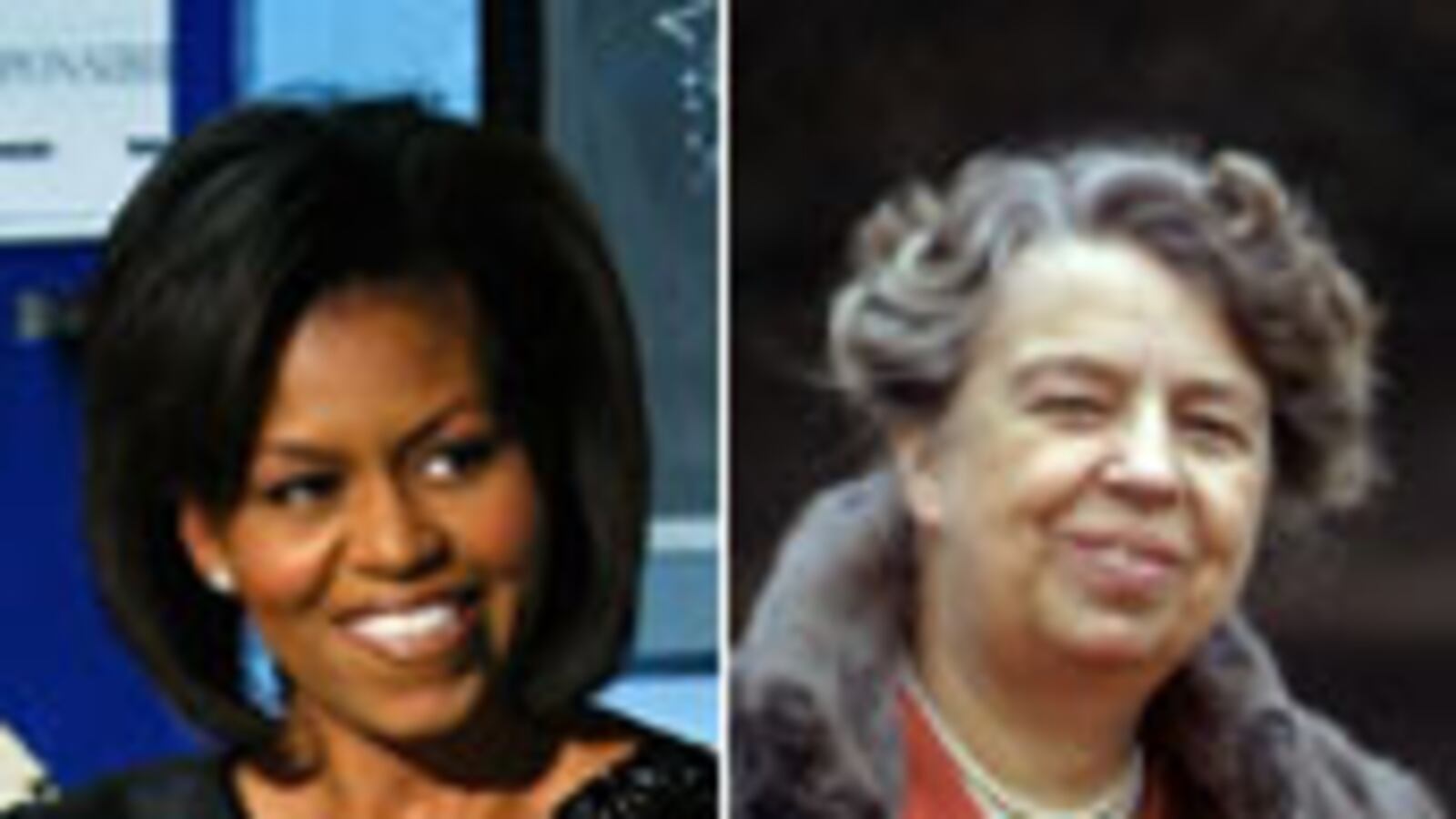
Dolley Madison saved the White House and Edith Wilson took control of it, but Eleanor Roosevelt was the one who brought it to the people.
Traveling extensively and obeying none but her own curiosity, Mrs. Roosevelt revolutionized the role of the first lady. It was a job she didn’t even want at first. When her husband, Franklin, was nominated by the Democrats in 1932, she panicked, dreading the move to Washington and a life she regarded as “a prison.” With the encouragement of Louis Howe, the best friend and political adviser that she and Franklin shared, she broke out of jail in spectacular form. While Franklin gave avenues of hope to the American population, Eleanor gave it faces, names and stories.
“I lived those [White House] years very impersonally. It was almost as though I had erected someone a little outside of myself who was the president’s wife.”
Michelle Obama has yet to find a clear voice as a first lady. Perhaps she wants it that way. Or perhaps she simply needs to take the advice of Eleanor Roosevelt. A formal introduction might be somewhat tricky to arrange, Mrs. O. having been born in 1964, two years after Mrs. R. passed away. But if they were to meet, the conversation might just go like this—Michelle’s comments being imagined while Eleanor’s words are her own from speeches and writings—eavesdropped from history, verbatim:
Michelle: What was the worst thing about your first months in the White House?
Eleanor: “It was hard for me to remember that I was not just ‘Eleanor Roosevelt,’ but the ‘wife of the president.’”
Michelle: You were good, though. In one year, you had 9,000 people in for tea and 4,000 for lunch. I don’t know if I would’ve held up, greeting so many people.
Eleanor: “Bend your knees, frequently. No one will notice and you will be less tired.”

Michelle: Louis Howe started the idea of your visiting regular people to see conditions for yourself. How would I decide where to go?
Eleanor: “I try not to see any projects that aren’t new. What I’m trying to do is see all the things that have any original side to them —something different from what somebody else thought about before.”
Michelle: Why didn’t you contain yourself to a particular cause: “Keep America Beautiful” or “Just Say No to Drugs” for instance?
Eleanor: “Someone wrote me the other day that I would accomplish more if I would take one or two things and work at them.”
Michelle: What do you think of that?
Eleanor: “I have no way in which I could give a certain amount of hours to anything. You just take whatever comes along and do the best you can and feel that you are gaining a general education and you’re doing what seems useful wherever possible. It may not be useful. I don’t mean that it always is.”
Michelle: How did you manage to speak on controversial topics without hurting President Roosevelt?
Eleanor: I never said anything, or wrote anything, without first balancing it against the objectives which I thought he was working for at the time.
Michelle: Did he try to rein you in?
Eleanor: “Never.”
Michelle: Never?
Eleanor: “Never in all the years can I remember his asking me not to say or to write anything, even though we occasionally argued vehemently and sometimes held diametrically opposite points of view on things of the moment.”
Michelle: But the criticism—no matter what a first lady does, there’s somebody to pick on it. It makes you think twice…
Eleanor: “No human being enjoys being disliked, so it would be normal to try to avoid actions which bring criticism.”
Michelle: Right. So...
Eleanor: “When it comes to deciding on whether you will be a Dresden china figure, daintily placed on the mantlepiece, and thus avoid any criticism, or lead a strictly personal life when the world is rocking on its foundations, or face the criticism and at least try to live as an independent citizen of the United States, considering it your duty to use such opportunities that come your way for service as you see it, then the decision for certain people will be easy.”
Michelle: It doesn’t seem fair. You’re saying that first ladies should do things, even if they get blasted for it.
Eleanor: “They will do and be damned, but the others who won’t do, what of them? You might expect them to be praised but that is not the way it works. In these situations you’re damned if you do and damned if you don’t.”
Michelle: Was there any one time you remember somebody trying to discourage you?
Eleanor: “A cartoon appeared depicting two miners looking up in surprise and saying with undisguised horror, “Here comes Mrs. Roosevelt!” In strange and subtle ways, it was indicated to me that I should feel somewhat ashamed of that cartoon and that there certainly was something the matter with a woman who wanted to see so much and know so much.
Michelle: Should I try to be more like you, do you think?
Eleanor: “Nothing could be more dreadful than to expect any one who isn’t interested in the things that interest me, to live the way I live.”
Michelle: First ladies in general, then. Not just me.
Eleanor: “Wives of future presidents, I hope, will follow their own inclinations, otherwise they will be uncomfortable and unhappy.”
Michelle: The way you thought you would be.
Eleanor: “I lived those years very impersonally. It was almost as though I had erected someone a little outside of myself who was the president’s wife. I was lost somewhere deep down inside myself. That is the way I felt and worked until I left the White House.”
Sources for Eleanor Roosevelt quotes: (“It was hard”) E.R., This I Remember (New York: Harper, 1949), p. 89. (“Bend your knees”) This I Remember, p. 90. (“I try not to see”) E.R. Press Conference Nov. 8, 1939; Maurine Beasley, ed., The White House Press Conferences of Eleanor Roosevelt (New York: Garland, 1983), p. 138. (“Someone wrote me”) E.R. Press Conference Jan. 31, 1939; ibid, p. 85. (“I have no way”) E.R. Press Conference Jan. 31, 1939; ibid, p. 85-6. (“I never said”) E.R., “Why I Do Not Choose to Run,” Look, Jul. 9, 1946, reprinted in Allida M. Black, editor, What I Hope to Leave Behind (New York: Carlson, 1995), p. 36. (“Never in all”) ibid, p. 35. (“No human being”) E.R., “How to Take Criticism,” Ladies Home Journal, Nov., 1944, ibid, p. 31. (“When it comes”) ibid. (“They will do”) ibid. (“A cartoon appeared”) E.R., “In Defense of Curiosity,” Saturday Evening Post, Aug. 24, 1935, ibid, p. 17. (“Nothing could be”) Kathleen McLaughlin, “The First Lady’s View of the First-Lady Role,” New York Times, Jan., 21, 1940, p. M-96 (“Wives of future”) ibid. (“I lived those years”) This I Remember, p. 350.
Plus: Check out Book Beast, for more news on hot titles and authors and excerpts from the latest books.
Julie M. Fenster is a historian whose latest book is about the unusual relationship of Franklin Roosevelt, Louis Howe, and Eleanor Roosevelt: FDR's Shadow. She co-wrote the New York Times bestseller Parish Priest with Douglas Brinkley.






